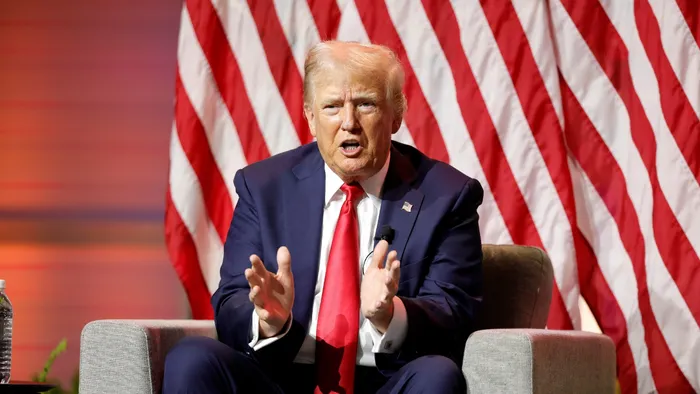
Trump’s April 2 “Liberation Day” announcement saw duties being levies across the world with South Africa attracting around 30%.
Image: Kamil Krzaczynski / AFP
US President Donald Trump’s frightening import duties on that country are already pushing down sales of cars made locally for the export market, and his moves effectively nullify benefits under the African Growth and Opportunity Act (AGOA).
However, South Africans are nothing if not resourceful and are already planning how best to target alternative auto markets.
The National Economic Development and Labour Council (Nedlac) provides figures that indicate that more than 360,000 vehicles “set sail” for more than 150 countries across the world in 2023.
Of these, the best sellers were the Volkswagen Polo, followed by the Mercedes C-Class, the BMW X3, and then what it called a “bakkie” tussle between the Ford Ranger and the Toyota Hilux, with the former winning out.
Most locally produced vehicles for export go to Europe, where sales are already under threat due to that bloc’s increasingly strict carbon emission requirements. Nedlac added that Isuzu and Nissan are also slowly making inroads into African markets.
In 2024, however, exports dropped some 22.8%, which could be likely linked to the fact that 2023 was an all-time high, figures from NAAMSA (the Automotive Business Council) showed.
Of South Africa’s top export destinations in this sector, OEC noted that most vehicles produced in 2023 went to Germany, followed by the US, and then the UK. Now South Africa’s exports to America are under threat, with Trump’s sweeping tariffs already having an adverse impact.
Smart Procurement stated that the South African automotive sector “is particularly vulnerable” to tariffs. Its figures show that vehicles account for about a fifth of all exports to the US each year, amounting to about R33 billion annually.
Trump’s April 2 “Liberation Day” announcement saw duties being levies across the world with South Africa attracting around 30%. Although Trump walked back many of these taxes in the coming days and is in talks with several countries to negotiate better trade conditions, the local automotive industry has already been hit with a 25% export tax, and there could be more in the wings depending on which way the US President moves.
Dr Paulina Mamogobo, the Automotive Business Council chief economist at NAAMSA said that US tariffs already had a rather pre-emptive impact on first quarter sales as exports to the US reduced from 6% in 2024 to 2% in the first three months of the year.
Before the implementation of the new regulations, 99% of vehicles and automotive components from South Africa entered the US under the AGOA agreement, benefiting from duty-free treatment.
Jenny Tala, director for Southern Africa at Germany Trade & Invest, said that the US’ tariffs effectively nullify the benefits of AGOA, which poses a threat to South Africa's automotive manufacturing competitiveness. Tala said the solution is to diversify export markets by expanding regional and international trade relations.
“As we navigate shifting trade agreements, tariffs, and international relations, South African automotive businesses are actively seeking new partnerships and market opportunities," said Michael Dehn, MD at trade fair company Messe Frankfurt.
Local companies are “repositioning themselves within evolving trade frameworks” such as within the African Continental Free Trade Area (AfCFTA) and other BRICS+ countries: Brazil, Russia, India, China, among others, said Dehn.
Mamogobo stated that the AfCFTA is a strategic response to many challenges, and it has opened up access to a $3.4 trillion economic market across 44 African countries by eliminating tariffs and boosting intra-regional trade. Yet, infrastructure gaps remain a significant challenge to fully realising this potential, she said.
Ronel Oberholzer, head of sub-Saharan Africa Economics at S&P Global Market Intelligence, explained that the global automotive landscape is further complicated by China's oversupply of vehicles, especially EVs, potentially getting into African markets, creating direct competition for South African manufacturing, while India's low-cost advantage intensifies competitive pressures.
As a result, she believes that BRICS countries may not be new markets so much as a source of further investments into Africa.
